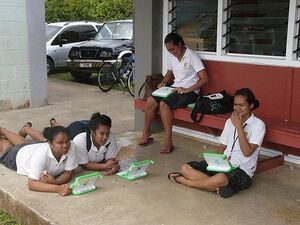
Climate action[edit | edit source]
2008: Niue is a particpant of the United Nations Environment Programme's Climate Neutral Network. Niue is hoping to become carbon neutral in the near future. Niue's own annual CO2 emissions are approximately 0.003 million metric tonnes for a population of about 1,700. The Government of Niue focuses in particular on the transport and energy sectors as the major contributors of greenhouse gas emissions. It promotes the use of energy saving appliances and compact fluorescent light bulbs, and, in the case of transport, enforces maximum speed limits and encourages carpooling. It also works to cut down carbon emissions through better waste management and harnessing renewable energy resources.[1]
Communities online[edit | edit source]
In 2003, Niue became the world's first "Wi-Fi nation", in which free wireless Internet access is provided throughout the country by The Internet Users Society-Niue.[2]
Community energy[edit | edit source]
Wikipedia: Niue, Renewable energy
About Niue[edit | edit source]
Niue (, ; Niuean: Niuē) is a self-governing island country in free association with New Zealand. It is situated in the South Pacific Ocean and is part of Polynesia, and predominantly inhabited by Polynesians. The island is commonly referred to as "The Rock", which comes from the traditional name "Rock of Polynesia".
Niue is located in a triangle between Tonga, Samoa, and the Cook Islands. It is 2,400 kilometres (1,500 mi) northeast of New Zealand, and 604 kilometres (375 mi) northeast of Tonga. Niue's land area is about 261.46 square kilometres (100.95 sq mi) and its population was 1,689 at the Census in 2022. Niue is one of the world's largest coral islands. The terrain of the island has two noticeable levels. The higher level is made up of a limestone cliff running along the coast, with a plateau in the centre of the island reaching approximately 60 metres (200 ft) above sea level. The lower level is a coastal terrace approximately 0.5 km (0.3 miles) wide and about 25–27 metres (80–90 feet) high, which slopes down and meets the sea in small cliffs. A coral reef surrounds the island, with the only major break in the reef being in the central western coast, close to the capital, Alofi. Niue is subdivided into 14 villages (municipalities). Each village has a council that elects its chairperson. The villages are at the same time electoral districts; each village sends an assemblyperson to the Niue Assembly (parliament).
As part of the Realm of New Zealand, New Zealand conducts most diplomatic relations on behalf of Niue. Niueans are citizens of New Zealand and Charles III is Niue's head of state in his capacity as King of New Zealand. Between 90% and 95% of Niuean people live in New Zealand, along with about 70% of the speakers of the Niuean language. Niue is a bilingual country, with 30% of the population speaking both Niuean and English. The percentage of monolingual English-speaking people is only 11%, while 46% are monolingual Niuean speakers.
References
- ↑ United Nations Environment Programme, December 7 2008
- ↑ wikipedia:niue